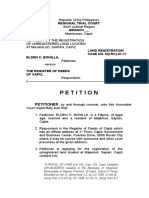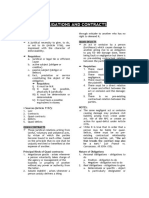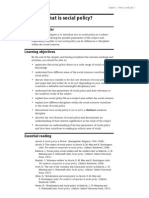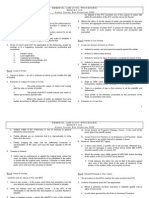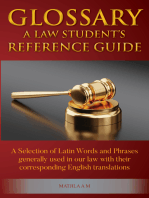Directed Against Particular Persons Judgment Is Binding Only Upon Parties Impleaded or Their Successors in Interest
Directed Against Particular Persons Judgment Is Binding Only Upon Parties Impleaded or Their Successors in Interest
Uploaded by
JohnCopyright:
Available Formats
Directed Against Particular Persons Judgment Is Binding Only Upon Parties Impleaded or Their Successors in Interest
Directed Against Particular Persons Judgment Is Binding Only Upon Parties Impleaded or Their Successors in Interest
Uploaded by
JohnOriginal Description:
Original Title
Copyright
Available Formats
Share this document
Did you find this document useful?
Is this content inappropriate?
Copyright:
Available Formats
Directed Against Particular Persons Judgment Is Binding Only Upon Parties Impleaded or Their Successors in Interest
Directed Against Particular Persons Judgment Is Binding Only Upon Parties Impleaded or Their Successors in Interest
Uploaded by
JohnCopyright:
Available Formats
(B)
ACTION IN ACTION IN ACTION
REM PERSONAM QUASI IN REM
Directed Directed Directed
against the against against
thing itself particular particular
persons persons
Judgment is Judgment is Judgment
binding on the binding only binding upon
whole world upon parties particular
impleaded or persons, but
their the real motive
successors in is to deal with
interest real property
or to subject
said property
to certain
claims.
Ex. Land Ex. action to Ex. Unlawful
registration recover detainer or
case; probate damages; forcible entry;
proceedings action for judicial
for allowance breach of foreclosure of
of a will. contract mortgage.
(C)
REAL PERSONAL MIXED
ACTION ACTION ACTION
personal property Both real
Ownership or is and
possession of sought to be personal
real property recovered or properties
is where are
damages for
involved breach involved
of contract are
sought
Founded on Founded on privity Founded on
privity of of contract both
estate
Ex. Action for a
ex. Accion sum ex. Accion
reinvidicatoria of money publiciana
with a claim
for damages
ACTION CLAIM
An ordinary suit in a A right possessed by
court of justice one against another
One party prosecutes The moment said
another for the claim is filed before a
enforcement or court, the claim is
protection of a right converted into an
or the prevention or action or suit.
redress of a wrong.
CLASSIFICATION OF ACTIONS.
(A)
ORDINARY CIVIL SPECIAL CIVIL
ACTION ACTION
Governed by ordinary Also governed by
rules ordinary rules but
SUBJECT to specific
rules prescribed (Rules
62 to 71).
Formal demand of Special features not
one’s legal rights in a found in ordinary civil
court of justice in the actions
manner prescribed by
Note:
Ejectment or accion interdictal takes on two forms: forcible entry and unlawful detainer. The remedies for forcible entry and unlawful detainer
are laid down in Section 1, Rule 70 of the Rules of Court, which states:
Section 1. Who may institute proceedings, and when.-Subject to the provisions of the next succeeding section, a person deprived of the
possession of any land or building by force, intimidation, threat, strategy, or stealth, or a lessor, vendor, vendee, or other person against whom the
possession of any land or building is unlawfully withheld after the expiration or termination of the right to hold possession, by virtue of any
contract, express or implied, or the legal representatives or assigns of any such lessor, vendor, vendee, or other person, may, at any time within
one (1) year after such unlawful deprivation or withholding of possession, bring an action in the proper Municipal Trial Court against the person
or persons unlawfully withholding or depriving of possession, or any person or persons claiming under them, for the restitution of such
possession, together with damages and costs.
the distinction between forcible entry and unlawful detainer had been clearly explained:
Forcible entry and unlawful detainer cases are two distinct actions defined in Section 1, Rule 70 of the Rules of Court.
In forcible entry, one is deprived of physical possession of land or building by means of force, intimidation, threat, strategy, or stealth.
In unlawful detainer, one unlawfully withholds possession thereof after the expiration or termination of his right to hold possession under any
contract, express or implied.
In forcible entry, the possession is illegal from the beginning and the basic inquiry centers on who has the prior possession de facto.
In unlawful detainer, the possession was originally lawful but became unlawful by the expiration or termination of the right to possess, hence the
issue of rightful possession is decisive for, in such action, the defendant is in actual possession and the plaintiff's cause of action is the
termination of the defendant's right to continue in possession.
What determines the cause of action is the nature of defendant's entry into the land. If the entry is illegal, then the action which may be filed
against the intruder within one (1) year therefrom is forcible entry. If, on the other hand, the entry is legal but the possession thereafter became
illegal, the case is one of unlawful detainer which must be filed within one (1) year from the date of the last demand.
Accion Reinvidicatoria
You might also like
- San Beda Memory Aid Civil ProcedureDocument63 pagesSan Beda Memory Aid Civil Proceduretheamorerosa83% (30)
- Sample Petition For Registration of Unregistered LandDocument3 pagesSample Petition For Registration of Unregistered LandElden Cunanan Bonilla78% (9)
- Obligations and Contracts LectureDocument28 pagesObligations and Contracts LectureMila Casandra CastañedaNo ratings yet
- Chapter 2 Oblicon ReviewerDocument21 pagesChapter 2 Oblicon ReviewerWency Niluag100% (1)
- Reviewer in Special ProcedureDocument12 pagesReviewer in Special ProcedureNaethan Jhoe L. Cipriano100% (1)
- Readings On Civil ProcedureDocument63 pagesReadings On Civil ProcedureMalu GaminoNo ratings yet
- Special Civil Action NotesDocument45 pagesSpecial Civil Action NotesAnisah Aquila80% (5)
- Oblicon TolentinoDocument73 pagesOblicon Tolentinotheresebernadette100% (3)
- Corporation Code of The Philippines ReviewerDocument3 pagesCorporation Code of The Philippines ReviewerJohnNo ratings yet
- Response in Hamilton Co., Wilkey, McRae LawsuitDocument22 pagesResponse in Hamilton Co., Wilkey, McRae LawsuitNewsChannel 9 StaffNo ratings yet
- Charles - Motion To QuashDocument8 pagesCharles - Motion To QuashMayor LeoNo ratings yet
- What Is Social PolicyDocument25 pagesWhat Is Social Policylolab_4No ratings yet
- Civil Procedure: Rule 1 General ProvisionsDocument62 pagesCivil Procedure: Rule 1 General ProvisionsJeffrey Dela PazNo ratings yet
- Civil ProcedureDocument62 pagesCivil ProcedureJeffrey Dela PazNo ratings yet
- Summary Note PreweekDocument3 pagesSummary Note PreweekJohnNo ratings yet
- Civil Procedure San Beda Memory AidDocument63 pagesCivil Procedure San Beda Memory AidHabi MarohombsarNo ratings yet
- San Beda College of Law: Civil ProcedureDocument85 pagesSan Beda College of Law: Civil ProcedureJeddel Grace CortezNo ratings yet
- Civ ProcDocument85 pagesCiv ProcJanin GallanaNo ratings yet
- CIVPRODocument7 pagesCIVPROalliyeah10No ratings yet
- Jury SPECIAL CIVIL ACTIONSDocument25 pagesJury SPECIAL CIVIL ACTIONSRyannDeLeonNo ratings yet
- Rules 626365 Reviewer RianoDocument20 pagesRules 626365 Reviewer RianoJade Lorenzo100% (1)
- Civil ProcedureDocument51 pagesCivil ProcedureBerniceAnneAseñas-ElmacoNo ratings yet
- III. Civil Procedure (Part 1) : Wednesday, 7 October 2020 6:00 PMDocument8 pagesIII. Civil Procedure (Part 1) : Wednesday, 7 October 2020 6:00 PMMarc Lester ChicanoNo ratings yet
- Memory Aid 03 Civil ProcedureDocument119 pagesMemory Aid 03 Civil ProcedureLalaNo ratings yet
- TableDocument21 pagesTableKim Barrios100% (1)
- Ordinary Civil Actions Week 4 Recit Case IntegDocument35 pagesOrdinary Civil Actions Week 4 Recit Case IntegNeil FrangilimanNo ratings yet
- CivPro ReviewerDocument64 pagesCivPro ReviewerForth BridgeNo ratings yet
- Philippine Long Distance Telephone Company vs. Citi Appliance M.C. Corporation, 922 SCRA 518, October 09, 2019Document41 pagesPhilippine Long Distance Telephone Company vs. Citi Appliance M.C. Corporation, 922 SCRA 518, October 09, 2019Jane BandojaNo ratings yet
- Notes Rule 1 6 FinalDocument102 pagesNotes Rule 1 6 FinalWinston Mao TorinoNo ratings yet
- Spec Pro Midterm ReviewerDocument69 pagesSpec Pro Midterm ReviewerGiulia MaderaNo ratings yet
- Civil Procedure San Beda Memory AidDocument64 pagesCivil Procedure San Beda Memory AidRonald Z. RayaNo ratings yet
- Viii. Special Civil Actions: A. in GeneralDocument45 pagesViii. Special Civil Actions: A. in GeneralRudejane TanNo ratings yet
- Brondial AuslDocument164 pagesBrondial AuslGolden LightphNo ratings yet
- Special Proceedings - Week 1Document14 pagesSpecial Proceedings - Week 1Angelo NavarroNo ratings yet
- UST G N 2011: 2. Ordinary Civil Actions Versus Special Civil ActionsDocument33 pagesUST G N 2011: 2. Ordinary Civil Actions Versus Special Civil ActionsMenandro DavidNo ratings yet
- Obligation and ContractsDocument3 pagesObligation and Contractsrosalyngayoso11No ratings yet
- CIVIL PROCEDURE ReviewerDocument270 pagesCIVIL PROCEDURE ReviewerJaved Fogata100% (1)
- Remedial LawDocument88 pagesRemedial LawAntoniette Maria LuceroNo ratings yet
- ACTIONSDocument3 pagesACTIONSMartin GaciasNo ratings yet
- 03.1 CIVPRO - Rules 1 - 6Document34 pages03.1 CIVPRO - Rules 1 - 6Myco MemoNo ratings yet
- APC - Obligations - Chapter 2Document7 pagesAPC - Obligations - Chapter 2AP CruzNo ratings yet
- Memory Aid Civil ProcedureDocument32 pagesMemory Aid Civil ProcedureihreNo ratings yet
- Civil Procedure NotesDocument1 pageCivil Procedure NotesClee Ayra CarinNo ratings yet
- Civil Law Reviewer - ObliconDocument14 pagesCivil Law Reviewer - ObliconKin Pearly FloresNo ratings yet
- Part Spec ProDocument110 pagesPart Spec ProMary Megan TaboraNo ratings yet
- Remedial Law Part IX-special ProceedingsDocument137 pagesRemedial Law Part IX-special ProceedingsJenely Joy Areola-TelanNo ratings yet
- Provisional Remedies MahusayDocument9 pagesProvisional Remedies MahusayCabañero Legal TeamNo ratings yet
- Forcible Entry and Unlawful Detainer Rule 70Document7 pagesForcible Entry and Unlawful Detainer Rule 70IAN ANGELO BUTASLACNo ratings yet
- Introduction To LawDocument2 pagesIntroduction To Lawa.balaba.546057No ratings yet
- A. ObligationsDocument8 pagesA. ObligationsVivian NiñonNo ratings yet
- Notes of Special Civil Actions - BemJamisonDocument26 pagesNotes of Special Civil Actions - BemJamisonBeverlyn Jamison100% (1)
- Obligations and Contracts: San Beda College of LawDocument29 pagesObligations and Contracts: San Beda College of LawCarmela Lopez100% (1)
- Remedial Law DistinctionsDocument14 pagesRemedial Law DistinctionsMaurice Bryan RoslindaNo ratings yet
- SCA Based On Atty. Duano Lumbre IncompleteDocument16 pagesSCA Based On Atty. Duano Lumbre IncompleteEduard Loberez ReyesNo ratings yet
- Oblicon Reviewer 1156-1159Document10 pagesOblicon Reviewer 1156-1159Delmas Ibera100% (1)
- Chapter 5 - Basic Remedial LawDocument4 pagesChapter 5 - Basic Remedial LawRobinson MojicaNo ratings yet
- Pat Notes ObliConDocument7 pagesPat Notes ObliConAP CruzNo ratings yet
- Chapter 5 - Basic Remedial LawDocument4 pagesChapter 5 - Basic Remedial LawRobinson MojicaNo ratings yet
- Obligations and Contract (Oblicon)Document3 pagesObligations and Contract (Oblicon)Mayrll SantosNo ratings yet
- Rule 1Document15 pagesRule 1pasmo100% (1)
- Civil Law - Obligations and Contracts Reviewer (Part 1)Document13 pagesCivil Law - Obligations and Contracts Reviewer (Part 1)Samantha Claire CepedaNo ratings yet
- Makati Stock Exchange Vs CamposDocument30 pagesMakati Stock Exchange Vs CamposShingo TakasugiNo ratings yet
- Accion in Rem VersoDocument15 pagesAccion in Rem VersoJohnNo ratings yet
- Tax Transcription Complete Lumbera PDFDocument97 pagesTax Transcription Complete Lumbera PDFJohn100% (1)
- Administrative Law: of Administrative Authorities and Indicates To Individual Remedies For Violations of His RightsDocument16 pagesAdministrative Law: of Administrative Authorities and Indicates To Individual Remedies For Violations of His RightsJohnNo ratings yet
- Ii. Powers of Administrative Bodies.: 1.quasi-Legistative or Rule-Making PowerDocument10 pagesIi. Powers of Administrative Bodies.: 1.quasi-Legistative or Rule-Making PowerJohnNo ratings yet
- Syllabus Update Introduction To Public Personnel Management With Course DescriptionDocument1 pageSyllabus Update Introduction To Public Personnel Management With Course DescriptionJohnNo ratings yet
- Law On Public Officers: A. General PrinciplesDocument24 pagesLaw On Public Officers: A. General PrinciplesJohnNo ratings yet
- Part-I 15 Pts (Discussion) : Pangasinan State University Score: Lingayen, Pangasinan Lingayen Campus DateDocument1 pagePart-I 15 Pts (Discussion) : Pangasinan State University Score: Lingayen, Pangasinan Lingayen Campus DateJohnNo ratings yet
- PSBA Vs LeanoDocument2 pagesPSBA Vs LeanoRM MallorcaNo ratings yet
- Challenges To Peacebuilding PDFDocument27 pagesChallenges To Peacebuilding PDFoscaralejoNo ratings yet
- Baloch Insurgencies 1948Document24 pagesBaloch Insurgencies 1948Muhammad YaseenNo ratings yet
- F.No.5 (11) 2019-MSW-V Government of Pakistan Cabinet Secretariat Establishment Division Working Paper For 15 Ic Meeting TO BE HELD ON 10-12-2019Document2 pagesF.No.5 (11) 2019-MSW-V Government of Pakistan Cabinet Secretariat Establishment Division Working Paper For 15 Ic Meeting TO BE HELD ON 10-12-2019Mian NovairNo ratings yet
- Adr Act of 2004Document40 pagesAdr Act of 2004Zen DanielNo ratings yet
- Case No. Case Title & G.R./Scra No. Facts/Issue/RulingDocument6 pagesCase No. Case Title & G.R./Scra No. Facts/Issue/RulingDhustinne BadanaNo ratings yet
- GPA FormatDocument4 pagesGPA FormatBalakrishna GM GowdaNo ratings yet
- Anti Drunk DrivingDocument10 pagesAnti Drunk DrivingTeoti Navarro ReyesNo ratings yet
- LABOR CODE - St. Joseph Academy of Valenzuela Faculty Assoc. v. St. Joseph Academy of ValenzuelaDocument4 pagesLABOR CODE - St. Joseph Academy of Valenzuela Faculty Assoc. v. St. Joseph Academy of ValenzuelaKaloi GarciaNo ratings yet
- Article 41 in The Constitution of India 1949Document8 pagesArticle 41 in The Constitution of India 1949geetkumar18No ratings yet
- Pilipinas Shell VS RomarDocument2 pagesPilipinas Shell VS RomarLei Jeus TaligatosNo ratings yet
- Directive Principles On State PolicyDocument19 pagesDirective Principles On State PolicyAnonymous u7kaaoXNo ratings yet
- 5.1 The Dawn of The Victorian Age: Queen VictoriaDocument12 pages5.1 The Dawn of The Victorian Age: Queen VictoriamicoleNo ratings yet
- SquattingDocument2 pagesSquattingJohn ClementeNo ratings yet
- 9 People-v-CapalacDocument1 page9 People-v-CapalacAnonymous fL9dwyfekNo ratings yet
- Legal Ethics - Magtibay v. Judge Indar, A.M. No. RTJ-11-2271, September 24, 2012Document2 pagesLegal Ethics - Magtibay v. Judge Indar, A.M. No. RTJ-11-2271, September 24, 2012Dayday AbleNo ratings yet
- Polity Questions With Answers in EnglishDocument60 pagesPolity Questions With Answers in Englishpraba mouliNo ratings yet
- Panganayi F Public Procurement Regulation in Zimbabwe A Constitutional AnalysisDocument33 pagesPanganayi F Public Procurement Regulation in Zimbabwe A Constitutional AnalysisPanganayi JamesNo ratings yet
- Librada M. Aquino, Petitioner, vs. Ernest S. Aure, RespondentDocument2 pagesLibrada M. Aquino, Petitioner, vs. Ernest S. Aure, RespondentArtemisTzyNo ratings yet
- Slide-Deck-2 - Secondary - Government in CanadaDocument15 pagesSlide-Deck-2 - Secondary - Government in CanadaJordan MeadeNo ratings yet
- Reynold Leone, as Administrator of the Estate of Andrea Leone, Also Known as Andrea Held, Deceased, Frances S. Costigan (Now Known as Costigan-Leeds), as of the Estate of George B. Costigan, Jr., Deceased v. United States, 910 F.2d 46, 2d Cir. (1990)Document8 pagesReynold Leone, as Administrator of the Estate of Andrea Leone, Also Known as Andrea Held, Deceased, Frances S. Costigan (Now Known as Costigan-Leeds), as of the Estate of George B. Costigan, Jr., Deceased v. United States, 910 F.2d 46, 2d Cir. (1990)Scribd Government DocsNo ratings yet
- YON Strategic Action PlanDocument9 pagesYON Strategic Action PlanMohammed Ali100% (1)
- United States v. Demetrius Spence, 4th Cir. (2014)Document12 pagesUnited States v. Demetrius Spence, 4th Cir. (2014)Scribd Government DocsNo ratings yet
- International Business Assignment 1Document3 pagesInternational Business Assignment 1SudheerNo ratings yet
- G.R. No. 75093 Sibal V Notre DameDocument7 pagesG.R. No. 75093 Sibal V Notre DameMaria Cristina MartinezNo ratings yet
- Eritrea: National Service - Slavery by Another NameDocument11 pagesEritrea: National Service - Slavery by Another NameMartin PlautNo ratings yet

